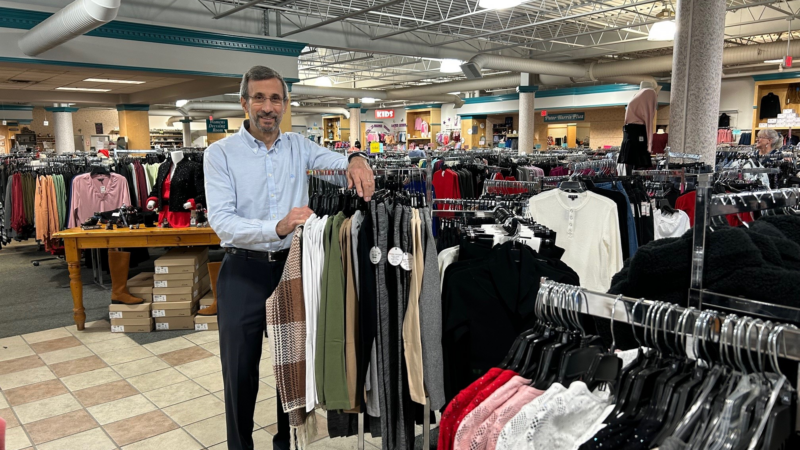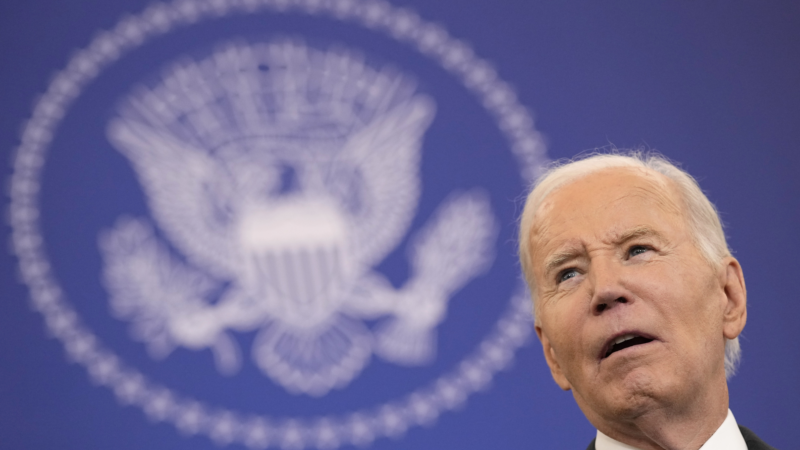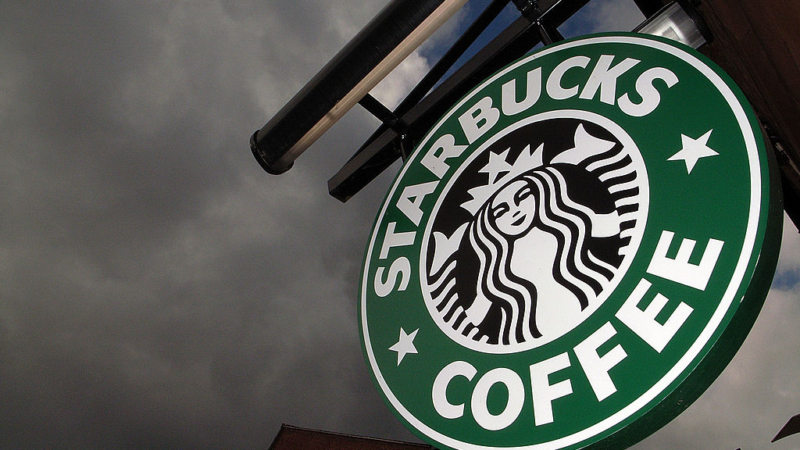Trump’s tariffs threat is dividing business owners across the country
The prospect of tariffs in the new Trump administration is dividing businesses around the country.
Some are scrambling to avoid the potential import taxes or preparing to pass the cost on to their customers. Others, however, are welcoming tariffs as a defense against foreign competition.
Here’s a look at how three businesses are bracing for the tariffs.
The domestic manufacturer
Mark McClelland is in the pro-tariff camp.
If you’ve ever sat in the bleachers to watch a high school football game, you may have come in contact with McClelland’s product. His company, Tower Extrusions, manufactures bleacher seats and thousands of other aluminum products.
“Think of a big Play-Doh machine,” McClelland says of the manufacturing process. “We take a log of aluminum and push it through a die in the shape of some form.”
McClelland’s business, based in Olney, Texas, operates eleven aluminum presses, cranking out bleachers, window frames, car parts and more.
“It’s kind of one of those old-line businesses that people don’t really think about, but when you look around, our product is kind of everywhere,” he says.
Starting around 2010, McClelland’s company and others the industry began to face increased competition from China. They fought back and won anti-dumping tariffs on Chinese aluminum products, but the import threat soon metastasized.

“What used to be just a China problem now has spread,” McClelland says, with surging imports from Vietnam, Turkey, India, and Mexico. “And of course Mexico is the one I really worry about, because there’s a direct route to our market.”
Foreign companies now supply about 35% of the extruded aluminum products in the U.S., McClelland adds, nearly double their share from five years ago.
“They’re selling at prices we can’t compete with,” McClelland says. “It’s going to shut down our industry if we don’t do something.”
President-elect Donald Trump has proposed adding a tax of 10% to 20% on all imports, and McClelland is counting on those sweeping tariffs to provide a more level playing field.
He acknowledges, however, that import taxes are a double-edged sword. His company has to pay more for the raw aluminum that goes into its products now because of tariffs that Trump imposed the last time he was in the White House.
“It drove up our raw material costs by 10%, whether we imported them or not,” McClelland recalls. “Even if it was produced domestically, it raises your costs 10%.”
The importer
Among those business owners who face higher costs is Bobby Djavaheri.
He worries that tariffs will raise the cost of his popular air fryers and other appliances, most of which are manufactured in China.
“I don’t think the American consumer understands what’s at stake here,” says Djavaheri, whose company, Yedi Houseware Appliances, is based in Los Angeles.
If Trump makes good on his threat to impose a 60% tariff on imports from China, he estimates that “a $130 item will turn into something way above $200.”
“Americans are directly being taxed with these tariffs, not the Chinese,” Djavaheri says.

Some have suggested that Trump is merely using the threat of tariffs as a bargaining chip and that import taxes are unlikely to take full effect — but Djavaheri isn’t counting on that.
“I take it very seriously,” he says. “We’re trying to ramp up our imports prior to the president-elect getting sworn in.”
Other importers are also racing to stockpile products before any tariffs take effect.
“If companies have the wherewithal to pull this product forward, to build up inventory and get their cost basis down before the new tariffs are put in, they’re trying it,” says Gene Seroka, executive director at the Port of Los Angeles. The port is busier than usual this time of year, unloading hundreds of thousands of shipping containers from Asia each month.
One of Djavaheri’s suppliers has also considered moving his factory from China to Mexico to avoid the steepest tariffs.
But that may not necessarily work. Last month, Trump proposed slapping a 25% tariff on imports from both Mexico and Canada, two of the United States’ biggest trading partners.
The discounter
Peter Elitzer is another business owner worried about the impact of tariffs.
He says even a 10% tariff would be painful for the customers who shop at his discount clothing stores. Bargain-hunters who frequent Elitzer’s Label Shopper stores on the East Coast and in the Midwest are already cautious about spending money.
“They’re only buying when they need to have something,” Elitzer says. “So it’s cold and they need a sweatshirt or jacket, they’ll come out and get it. If it’s too cold in the spring and they don’t need to buy T-shirts, they don’t buy T-shirts.”
That makes Elitzer wary about filling warehouses ahead of the potential tariffs with clothes that might not sell and run the risk of falling out of fashion. He’ll take his chances on imports from India, Indonesia and Cambodia, knowing that if tariffs do come, he’ll have to raise prices.
“There’s no question in my mind this is not going to be good news for the consumer at all,” Elitzer says. “Particularly if they’re trying to get inflation under control. It’s the worst possible time to do that.”
Most of the clothing items in his stores sell for $19.99 or below — less than he was charging a decade ago.
“The overwhelming majority of Americans don’t shop in the high-end department stores,” he says. “They’re shopping in Walmart and they’re shopping in the Label Shoppers of the world. And they’re looking for value.”
Transcript:
ARI SHAPIRO, HOST:
The prospect of tariffs in the new Trump administration is dividing businesses around the country. Some are scrambling to avoid the import taxes or preparing to pass the costs to their customers. Others are welcoming tariffs as a defense against foreign competition. Here’s NPR’s Scott Horsley.
SCOTT HORSLEY, BYLINE: If you’ve ever sat in the bleachers to watch a high school football game, you might have Mark McClelland to thank. His company, Tower Extrusions, makes those bleachers, along with thousands of other aluminum products.
MARK MCCLELLAND: Think of a big Play-Doh machine. We take a log of aluminum and push it through a die in the shape of some form.
HORSLEY: Bleachers, window frames, car parts and more all come squeezing through McClelland’s aluminum presses in Olney, Texas.
MCCLELLAND: It’s kind of one of those old-line businesses that people don’t really think about. But when you look around, our product’s kind of everywhere.
HORSLEY: But when McClelland looks around these days, he sees more and more foreign competition. Cheap aluminum products from Vietnam, Turkey, Mexico and other countries have captured about 35% of the U.S. market – nearly twice the share they had five years ago.
MCCLELLAND: It’s going to shut down our industry if we don’t do something. We’re down here in a little bitty town of 3,500 people, and we employ over 600 people. So it’s kind of the life of the town. You just feel a huge responsibility to make this thing work.
HORSLEY: McClelland is counting on Trump’s tariffs to raise the price of those imported aluminum goods and give him and other domestic manufacturers a fighting chance.
To companies in the import business, on the other hand, tariffs look very different. Bobby Djavaheri’s Los Angeles-based company, Yedi Houseware Appliances, sells air fryers and waffle irons, mostly made in China. Djavaheri says, if Trump makes good on his threat to slap a 60% tax on Chinese imports, he’ll be the one getting the bill.
BOBBY DJAVAHERI: These tariffs are being paid by us – not by the Chinese – by us.
HORSLEY: Djavaheri says that would raise the price of a $130 air fryer to $200 or more.
DJAVAHERI: I’m taking it very seriously. We’re trying to ramp up our imports prior to president-elect getting sworn in, and then we’ll go from there.
HORSLEY: Other importers are also racing to stockpile products before the tariffs kick in. But that doesn’t work for everyone. Peter Elitzer runs a chain of discount clothing stores on the East Coast and the Midwest called Label Shopper. He worries that filling warehouses with extra inventory could leave him saddled with clothes that are out of fashion. So he just has to take his chances knowing that if tariffs do come, he’ll have to raise prices.
PETER ELITZER: There’s no question in my mind that this is going to be not good news for the consumer at all. Particularly if they’re trying to get inflation under control, it’s the worst possible time to do that.
HORSLEY: Elitzer says even a 10% tariff would be a drag on sales. The bargain hunters who shop at his stores are already skittish, buying clothes only when a change in the weather means they have to.
ELITZER: The overwhelming majority of Americans don’t shop in the high-end department stores. They’re shopping in Walmart, and they’re shopping in the Label Shoppers of the world, and they’re looking for value.
HORSLEY: Even Mark McClelland, the aluminum manufacturer who’s rooting for tariffs, admits they can have a downside. The last time Trump was in the White House, he imposed tariffs on the raw aluminum McClelland uses to make bleachers and window frames. His company is still paying a price for that.
MCCLELLAND: It drove up our raw material costs by 10%. Whether we imported them or not, even if it was domestically produced, it just raises your cost 10%.
HORSLEY: While tariffs can offer a measure of protection for some industries, the import taxes ultimately drive up costs for everyone.
Scott Horsley, NPR News, Washington.
2 private lunar landers head toward the moon in a roundabout journey
In a two-for-one moonshot, SpaceX launched a pair of lunar landers Wednesday for U.S. and Japanese companies looking to jumpstart business on Earth's dusty sidekick.
Biden moves to lift state sponsor of terrorism designation for Cuba
President Biden notified Congress of his intent to lift the U.S. label of Cuba as a state sponsor of terrorism as part of a deal aided by the Catholic Church to free political prisoners on the island.
Dozens of survivors and dead pulled from abandoned South African mine
The mine has been the scene of a tense standoff between police and miners since authorities launched an operation to force the miners out by cutting off food and water from the surface.
South Korean law enforcement officers detain impeached President Yoon
Yoon was brought into custody about three hours after hundreds of law enforcement officers entered the residential compound in their second attempt to detain him over his imposition of martial law last month.
SEC sues Elon Musk, says he didn’t disclose Twitter ownership on time before purchase
The U.S. Securities and Exchange Commission says Musk failed to disclose his ownership of Twitter stock in a timely manner before buying the site and underpaid by $150 million for shares he bought.
No such thing as a free toilet: Starbucks reverses open bathroom policy
The new guideline is a reversal of a 2018 open-door policy that was implemented after two Black men, who had not ordered anything, were arrested at a Philadelphia store.






